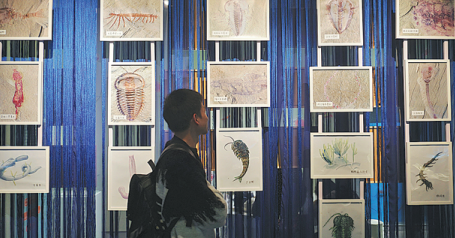Fossils fuel a passion for paleontology
Avid collector says more needs to be done on education and marketing

On the rocky hillsides of Beijing's Mentougou district it is common to see parents and their children with hammers in their hands fossicking for fossils 300 million years old.
The fossils found in the mountainous area near Huiyu village are mostly fragments of branches, leaves and plant stems formed in the Carboniferous Permian period, which spanned 60 million years and was characterized by an increase in the diversity of plant and animal life.
The area not only attracts teenagers who want to know more about paleontology, but also fossil hunters who want to gather them to sell or add to their collection.
Wang Kuan, 32, used to be one of those hunters. Now he owns a store that imports fossils from across the world. His customers include parents who buy the fossils for their children.
If Wang finds precious specimens, he gives them to public institutions. In 2018, he donated a new fish fossil, which was later named after him, to the Institute of Vertebrate Paleontology and Paleoanthropology in Beijing.
Wang believes that paleontology should be more popular, pointing out that his fossil store is the only one in Beijing.
"Usually, research institutes and museums collect specimens of paleontological fossils from the public every year, mainly from fossil hunters. However, China has plenty of fossils to be discovered, but limited human resources in this industry," he said.
Passion pursued
Wang studied pharmaceutical sciences at Peking University and has liked animals since he was a child.
"I used to do well in biological science competitions at school, but both my parents and I didn't want me to choose a related major such as paleontology. We thought that doing field work would be laborious," he said.
After graduating in 2014, Wang worked as a university administrator. However, after three years he resigned and turned his paleontology hobby into a job.
He said when choosing a career, a university major matters less than pursuing your interests.
"To attract more people to work and explore the field of fossils, we should encourage children to be educated. Let the public learn about prehistoric animals at an early age and help them actively explore their interests," Wang said.
However, Wang believes that fossils are not presented in a way that attracts the interest of children.
"Museums should adjust their ways of exhibiting, packaging and explaining fossils to be more interesting," he said, adding that better education of the public would help ensure protection of fossils.
Rich resources
Some remarkable discoveries in China have confirmed the country's rich fossil resources.
Large numbers of plant and animal fossils have been found in Liaoning province since the 1990s.
The fossil of Gigantoraptor, the largest bird-like dinosaur ever found, was discovered 15 years ago in the Inner Mongolia autonomous region.
Overseas experts have praised the discovery of feathered dinosaur fossils in China over the past two decades as a major advance in the understanding of the evolution of dinosaurs.
"We need to do more and to make science popular with children to develop their interest in paleontology," Wang said. "China has done very well in protection of fossils, but has still not done enough in turning education and marketing of them into an industry."
Wang refines the appearance of the fossils he collects to highlight the traces of plants and animals, otherwise they would just look like stones, he said. Sometimes customers can't see any markings.
"After getting these fossils, I need to prepare them based on gaps and traces in the rock layer. To highlight a creature in a stone takes at least a whole day," he said.
After the preparation, some trilobites and chrysanthemums are often visible in the fossils, and even bug antennae can be clearly seen.
Wang said that preparing the fossils is for the dual purposes of getting them ready for sale and popularizing paleontology. He said he hoped more people could see fossils in person, rather than looking at pictures of them online.


Today's Top News
- Global banks, institutions optimistic on China growth
- Goal of high-tech self-reliance unchanged: China Daily editorial
- Bid to sabotage South China Sea consensus shows Manila an irresponsible actor in region: China Daily editorial
- 'Zero-tariff'?a?blow to?zero-sum game
- China's railways hit record 2.24 billion passenger trips in H1
- Collection of Xi's articles on education, other two books published in Hong Kong






























